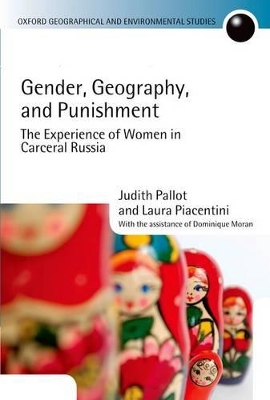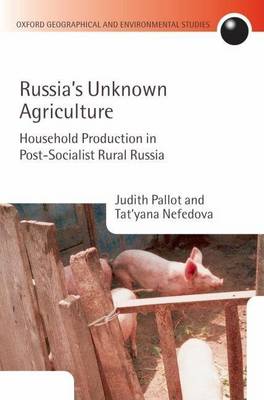Oxford Geographical and Environmental Studies
4 total works
Basing their findings on four years of research during which they studied rural districts drawn from a variety of contrasting regions of European Russia, the authors discuss the place of rural households in Russia's agri-food production system. They show that far from being solely concerned with 'survival' household plots in contemporary Russia are increasingly used to produce crops and livestock products for the market. In the book they describe the rich variety of
forms that small and independent farming takes today from highly localised clusters of cucumber or tomato producers to specialization in crop or animal husbandry at a higher spatial scale or associated with particular ethnic groups. The authors systematically examine the influence on past and present
practices of distance and the environment, the state of the large farm sector, local customs, and ethnicity on what households produce and how they produce it often using case studies of people they have met (plot holders, farmers, local officials) to illustrate their point. They criticise the tendency of the household production to be treated as the agricultural 'Other' in post-Soviet Russia and argue with the right incentives it has the potential for further development.
forms that small and independent farming takes today from highly localised clusters of cucumber or tomato producers to specialization in crop or animal husbandry at a higher spatial scale or associated with particular ethnic groups. The authors systematically examine the influence on past and present
practices of distance and the environment, the state of the large farm sector, local customs, and ethnicity on what households produce and how they produce it often using case studies of people they have met (plot holders, farmers, local officials) to illustrate their point. They criticise the tendency of the household production to be treated as the agricultural 'Other' in post-Soviet Russia and argue with the right incentives it has the potential for further development.
Gender, Geography, and Punishment: The Experience of Women in Carceral Russia
by Lecturer in Geography Judith Pallot and Laura Piacentini
Published 1 January 2012
Gender, Geography, and Punishment
by Judith Pallot, Laura Piacentini, and Dominique Moran
Published 1 September 2012
This book is the first of its kind that brings together human geography and the sociology of punishment to explore the relationship between distance and the punishment in contemporary Russia. Using established penological and geographical theories, the book presents in-depth empirical research to show how the experiences of women prisoners are shaped by the distances that the Russian penal service sends prisoners to serve their sentences. Its most eye-catching feature is its use of interviews conducted by the authors and their research team with adult and juvenile women prisoners, ex-prisoners and prison officers in penal facilities in different regions of the Russian Federation between 2006 and 2010. It includes discussion of the impact of Russia's distinctive penal geography on prisoners' family relationships, how women prisoners' sense of place and gender identities are shaped and re-shaped on their journey from pre-trial facility to 'correction colony' to release, and the social hierarchies, relationships and practices that characterise Russia's penal institutions for women. The authors are both experienced researchers in Russia. The book brings together their complementary disciplinary expertise in the development of the concept of 'coerced mobilization' to explore Russia's punishment culture. The book argues that Russia's inherited geography of penality, combined with traditional ideas about women's role that shape the penal service's management of women prisoners, add to their 'pains of imprisonment'. Crucially, the authors show how these factors are constraining the Russian penal service's ability to implement successive reforms aimed at humanizing Russia's notoriously tough prisons. Russian imprisonment as it relates to women is, they believe, an area of significant concern for lawmakers in that country as well as to human rights campaigners, geographers interested in space and power, and scholars studying the post-Soviet system.


